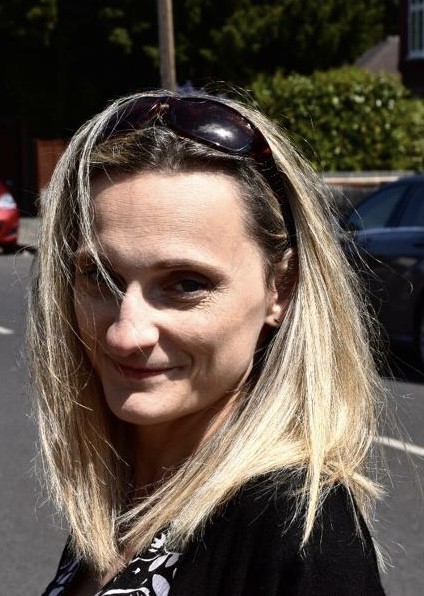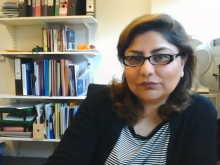Study options
- Starting in
- September 2025
- Location
- Mile End
- Fees
- Home: £12,250
Overseas: £25,500
EU/EEA/Swiss students
What you'll study
Your first two core modules, Approaches & Methods in English Language Teaching and Second Language Acquisition, will give you an excellent grounding in the basic methods and theories of language teaching and language learning. The third core module, Research Methods in Language Teaching, will introduce you to data collection and data analysis methods to enable you to succeed in your dissertation project.
From these solid foundations, you can then specialise in your chosen area. Elective modules cover subjects such as curriculum design and materials evaluation, educational technologies and software, the teaching of English in professional and academic contexts, language assessment, discourse analysis, or, if you're a native English speaker in particular, the fundamentals of English language, grammar and vocabulary.
You’ll become an accomplished language teacher. You'll gain valuable insights into the process of language teaching and learning by becoming a language learner: as part of the programme, you’ll study a foreign language for two semesters.
We will give you ample opportunities to observe English language teaching in classroom situations and reflect on good practice. You’ll also have opportunities to apply your theories.
All your lecturers in this programme are also practitioner teachers so you'll benefit from the most up-to-date expertise in English language teaching.
Our London location is also a significant advantage: you’ll be able to perfect your own language skills in an exciting multicultural environment.
Structure
- Four compulsory modules
- Two elective modules
- A choice of dissertation pathway: you can write a standard, research-oriented dissertation, or take a practice-based dissertation
Compulsory/Core modules
Approaches and Methods in English Language Teaching is a compulsory module on the MA in Applied Linguistics for English Language Teaching. Students are presented with a comprehensive overview of the main approaches and methods in language teaching, and have the opportunity to put these into practice: each week there is a lecture/interactive seminar to discuss the theoretical underpinnings of language teaching, followed by a practical session in which students will try out the different approaches in a peer/micro-teaching learning environment. Students will receive practical and formative feedback on their teaching sessions from both teachers and peers. The areas to be covered include: common assumptions of language teaching; the natural, oral and audio-lingual approaches; situational language teaching; social and cognitive construction; communicative language teaching; content-based Instruction; and task-based teaching.
Second Language Acquisition is a compulsory module on the MA in Applied Linguistics for English Language Teaching. Students are presented with a comprehensive overview of theories and current research in second language acquisition; in addition, students have opportunities to put language learning strategies into practice by being required, as part of this module, to learn a language which is not their own. Students can choose from: French, Spanish, German, Arabic, Japanese or Mandarin (depending on timetable constraints). Proficiency in the chosen language is not assessed, but we ask you to reflect on the learning strategies that you use while following your language course. The module explores: the history of language learning; goals of language teaching; the L2 user and the native speaker; individual learner differences; motivation and aptitude; learner strategies; multiple intelligences and multi-competences; group dynamics; general models of L2 learning; the interaction approach; socio-cultural SLA theory.
"This module is one of the two possible core modules in the MA in applied Linguistics for English Language Teaching. With your supervisor's guidance, you will select a topic for advanced study. You will have the opportunity to demonstrate your ability to justify the topic, to synthesise knowledge from the modules you have studied during the programme, to narrow your topic to research questions following a close reading of literature, to design and implement a research plan, to collect quantitative and/or qualitative data and to analyse and interpret this data in order to answer your research questions. You will also be able to demonstrate your ability to structure an extended piece of written work, and to construct an argument which supports your conclusions. Your dissertation will be 10,000 to 12,000 words, and you will be supported by guidance from your supervisor on a one-to-one basis."
"This module is one of the two possible core modules in the MA in applied Linguistics for English Language Teaching. Students who wish to attend the Level 5 Cambridge Certificate in Teaching English to Speakers of Other Languages (CELTA) course or Trinity Certificate in Teaching English to Speakers of Other Languages (CertTESOL) course will be given the opportunity to critically reflect on their learning in a 10,000 to 12,000 word dissertation. Students may choose this option at their own additional expense, and at an institution of their choice, but the CELTA/CertTESOL must be studied after the end of the second semester modules. Students will not be assessed on the professional qualification but will be assessed on their ability to write and reflect on their own teaching and learning: the teaching practice they have gained in the professional qualification course and the micro-teaching opportunities provided on the MA programme, together with the learning experiences they have gained on the MA programme as learners of another language, both integrated with the theories, concepts and methodologies they have discussed in the subject areas studied in the MA programme."
The module examines the various approaches to research and research design, providing guidance as to the appropriateness of certain methodologies in differing research scenarios. The module will provide an overview of key approaches with a critical discussion of the quantitative/qualitative divide and convergence. In the first part of the module we focus on research design and data collection instruments such as, for example, surveys and interviews. The second part focuses on qualitative and quantitative methods of data analysis. By the end of the module, and in readiness for their Masters dissertation, students should be able to understand the main research methods employed in Language Teaching and Applied Linguistics for data collection and be able to analyse data using a range of quantitative and qualitative methods.
This module explores the pedagogical applications of digital media, with an emphasis on Artificial Intelligence (AI) and adaptive learning systems in language education. It examines key developments in technology-enhanced teaching and practical approaches to designing, creating, and implementing AI-powered tools, adaptive platforms, and interactive media. Participants will develop innovative lesson ideas and materials, leveraging these technologies to personalise learning experiences, automate feedback, and enhance engagement, fostering effective, learner-centred practices in contemporary language teaching.
Elective modules
"Description of Language provides you with an overview of the nature and extent of linguistics and enables you to apply the systems of syntax, lexis, practical phonetics, and discourse to the language learning classroom. From your understanding of language, you then explore and evaluate the range of language learning materials and the sequencing of materials for language teaching and learning. The module allows you to apply your newly acquired knowledge of language and materials to the language learning classroom, both through micro-teaching with your peers, and through opportunities to observe language teaching in either English or another language."
"This optional module provides a focused route for students who wish to develop advanced knowledge and skills in teaching both English for Specific Purposes (ESP) and English for Academic Purposes (EAP). The module starts with the exploration of theoretical approaches and key research as well as pedagogical developments in the fields of ESP/EAP in the UK and across other national and international contexts. This in-depth introduction then moves on to the discussion of the principles of ESP/EAP course design, placing particular emphasis on practical knowledge of syllabus content/structure, material development and assessment methods."
The course offers an overview of key theoretical and methodological frameworks for doing discourse analysis in applied linguistics. Particular attention is paid to corpus-assisted studies of discourse which offer systematic insights in a variety of registers and settings. The module introduces students to corpus-assisted discourse analysis in two stages. The first part of the module will focus on the theoretical and practical aspects underlying discourse analysis. Students will learn how to systematically relate linguistic and semiotic properties of texts to the broader social and cultural contexts of which they are a part, and thereby to contribute to (1) the understanding and critique of social problems and inequalities, and (2) the development of critical language awareness in language learners. The second part will introduce the principles and theoretical constructs developed within corpus linguistics and corpus-assisted discourse analysis, as well as some of the most widely used corpora and corpus software.
Curriculum Design and Materials Evaluation for English Language Teaching is an optional module in the MA in Applied Linguistics for English Language Teaching. The module initially focuses on aspects of curriculum design, including language policies and pedagogies, by exploring: historical perspectives; environmental and situational analysis; needs analysis. The module also examines the relationship between curriculum ideology and learning outcomes and how this impinges on syllabus design, the role of teachers, and materials development. The second focus of the module is to present students with an overview of language program evaluation discussing at length: approaches to evaluation; evaluation practice and research; materials evaluation and multimedia materials evaluation. The module develops and deepens students understanding of issues in curriculum development by providing practice in evaluating language curricula and language teaching materials.
Assessment in English Language Teaching is an optional module for the MA in English Language Teaching (MAELT). It provides you with a comprehensive overview of the principles, practice and impact of assessment in English Language as well as the analytic skills to critique external language tests and design assessments relevant to the classroom. It consists of a weekly one-hour lecture and a two-hour seminar.
This module introduces you to language teaching at school. It includes French, German, Spanish, and Russian. The module can count for a degree in those languages. It also includes English but for exchange students only.
It is the first of two 15 credit modules, and it focuses on the theoretical aspects of language teaching - whereas the other one (SML6212 which runs during the second semester) focuses on practical matters.
Through the completion of this module, you will gain an understanding of key aspects of Applied Linguistics and Psycholinguistics. You will focus on theoretical aspects of second/ foreign language acquisition and their implications for teaching approaches and the design of teaching materials. This will involve planning, producing and delivering teaching materials. This module will also enable you to develop a range of transferable and professional skills such as organisational skills, communication skills, team-work, time management and problem-solving skills.
Important: If you are planning to attend the module SML6212 (Languages in the Classroom 2: Teaching and Reflective Practice) in semester 2, you will be required to complete a placement in a local school and will therefore require clearance from the UK's Disclosure and Barring Service (DBS).
Assessment
You will be assessed by a wide variety of methods, including poster presentations, technical exercises, critiques of theoretical and methodological proposals in the literature, research and lab reports, essays and extended written analyses.
Teaching
You’ll be taught in lectures and group seminars. The seminars are designed to generate informed discussion around set topics and may involve presentations, group exercises and role-play.
You'll also need to spend a significant amount of time in independent learning and research, especially as coursework deadlines approach.
We want you to get the best from your studies, so you'll be paired with your own Academic Adviser, who'll support you academically and pastorally.
Any student in receipt of a British Council Scholarship for India or Pakistan is required to take the Multimedia module and the Standard Research Dissertation pathway.
Where you'll learn
Facilities
- Our new Graduate Centre: purpose-built study spaces and a roof-top common room with a terrace
- Access to Queen Mary’s comprehensive libraries, including the Postgraduate Reading Room
- Access to the superb collections at Senate House Library, University of London
Campus
Our location in the heart of London's East End offers an exciting and rich cultural environment for linguistics research – over 110 languages are spoken in our local borough.
You are only minutes away from many of the University of London's other libraries, such as Senate House. The outstanding resources of the British Library are close at hand, while London's cultural resources add richness to research in our specialist fields.
About the School
School of the Arts
The School of the Arts combines innovation, discovery and excellence in education and research in Drama, Film, Modern Languages, English & Comparative Literature, Creative Writing, Linguistics and Liberal Arts. We rank in the top 100 worldwide for Arts and Humanities (QS World University Rankings by Subject 2024)
With our commitment to social justice, inclusivity and social mobility, our collaborations with external organisations, prominent writers and performers, and our facilities that support both academic and practice-based learning, an education in the School of the Arts equips our students with critical thinking and practical skills, unleashes their imagination and enables them to reach the levels of excellence needed in today’s industries.
We regularly host prominent writers and performers and collaborate with leading organisations such as the V&A, the Barbican, the Live Art Development Agency and Shakespeare’s Globe.
We are renowned for the depth and impact of research - which leads our teaching. We rank 1st for drama and in the top 10 for film in the UK for the quality of our research (REF2021). Our multilingual community brings together brilliant minds from across the world to share a wealth of expertise combining research excellence with an unrivalled commitment to social justice and social mobility.
Career paths
We want your MA programme to be a career investment: not only does this programme enable you to become a specialised language teacher, it also opens the door to further study in academia and to careers in language-related fields such as quality control, assessment, syllabus development and planning or educational technology.
Fees and funding
Full-time study
September 2025 | 1 year
- Home: £12,250
- Overseas: £25,500
EU/EEA/Swiss students
Unconditional deposit
Home: Not applicable
Overseas: £2000
Information about deposits
Part-time study
September 2025 | 2 years
- Home: £6,150
- Overseas: £12,750
EU/EEA/Swiss students
Unconditional deposit
Home: Not applicable
Overseas: £2000
Information about deposits
Queen Mary alumni can get a £1000, 10% or 20% discount on their fees depending on the programme of study. Find out more about the Alumni Loyalty Award
Funding
There are a number of ways you can fund your postgraduate degree.
- Scholarships and bursaries
- Postgraduate loans (UK students)
- Country-specific scholarships for international students
Our Advice and Counselling service offers specialist support on financial issues, which you can access as soon as you apply for a place at Queen Mary. Before you apply, you can access our funding guides and advice on managing your money:
Entry requirements
UK
Degree requirements
A 2:1 or above at undergraduate level in any subject
Other routes
Candidates that do not currently meet the set entry requirements may also have the option to study the Graduate Diploma in Humanities and Social Sciences. Meeting the required grades on completion of this programme will provide a pathway to study MA English Language Teaching.
Find out more about how to apply for our postgraduate taught courses.
International
English language requirements
The English language requirements for our programmes are indicated by English bands, and therefore the specific test and score acceptable is based on the band assigned to the academic department within which your chosen course of study is administered. Note that for some academic departments there are programmes with non-standard English language requirements.
The English Language requirements for entry to postgraduate taught and research programmes in the School of the Arts fall within the following English band:
Band 5: IELTS (Academic) minimum score 7.0 overall with 6.0 in each of Writing, Listening, Reading and Speaking
We accept a range of English tests and qualifications categorised in our English bands for you to demonstrate your level of English Language proficiency. See all accepted English tests that we deem equivalent to these IELTS scores.
Visas and immigration
Find out how to apply for a student visa.










